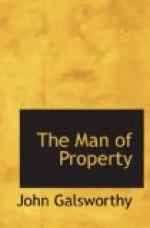Than James Forsyte, notwithstanding all his ‘Jonah-isms,’ there was no saner man (if the leading symptom of sanity, as we are told, is self-preservation, though without doubt Timothy went too far) in all this London, of which he owned so much, and loved with such a dumb love, as the centre of his opportunities. He had the marvellous instinctive sanity of the middle class. In him—more than in Jolyon, with his masterful will and his moments of tenderness and philosophy—more than in Swithin, the martyr to crankiness—Nicholas, the sufferer from ability—and Roger, the victim of enterprise—beat the true pulse of compromise; of all the brothers he was least remarkable in mind and person, and for that reason more likely to live for ever.
To James, more than to any of the others, was “the family” significant and dear. There had always been something primitive and cosy in his attitude towards life; he loved the family hearth, he loved gossip, and he loved grumbling. All his decisions were formed of a cream which he skimmed off the family mind; and, through that family, off the minds of thousands of other families of similar fibre. Year after year, week after week, he went to Timothy’s, and in his brother’s front drawing-room—his legs twisted, his long white whiskers framing his clean-shaven mouth—would sit watching the family pot simmer, the cream rising to the top; and he would go away sheltered, refreshed, comforted, with an indefinable sense of comfort.
Beneath the adamant of his self-preserving instinct there was much real softness in James; a visit to Timothy’s was like an hour spent in the lap of a mother; and the deep craving he himself had for the protection of the family wing reacted in turn on his feelings towards his own children; it was a nightmare to him to think of them exposed to the treatment of the world, in money, health, or reputation. When his old friend John Street’s son volunteered for special service, he shook his head querulously, and wondered what John Street was about to allow it; and when young Street was assagaied, he took it so much to heart that he made a point of calling everywhere with the special object of saying: He knew how it would be—he’d no patience with them!
When his son-in-law Dartie had that financial crisis, due to speculation in Oil Shares, James made himself ill worrying over it; the knell of all prosperity seemed to have sounded. It took him three months and a visit to Baden-Baden to get better; there was something terrible in the idea that but for his, James’s, money, Dartie’s name might have appeared in the Bankruptcy List.
Composed of a physiological mixture so sound that if he had an earache he thought he was dying, he regarded the occasional ailments of his wife and children as in the nature of personal grievances, special interventions of Providence for the purpose of destroying his peace of mind; but he did not believe at all in the ailments of people outside his own immediate family, affirming them in every case to be due to neglected liver.




